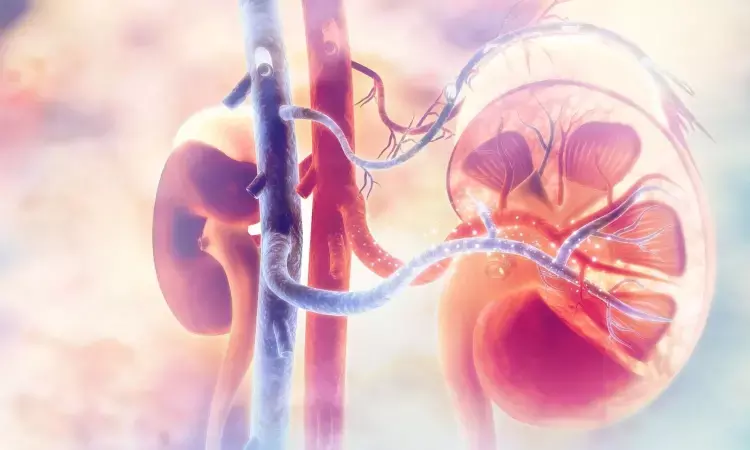- Home
- Medical news & Guidelines
- Anesthesiology
- Cardiology and CTVS
- Critical Care
- Dentistry
- Dermatology
- Diabetes and Endocrinology
- ENT
- Gastroenterology
- Medicine
- Nephrology
- Neurology
- Obstretics-Gynaecology
- Oncology
- Ophthalmology
- Orthopaedics
- Pediatrics-Neonatology
- Psychiatry
- Pulmonology
- Radiology
- Surgery
- Urology
- Laboratory Medicine
- Diet
- Nursing
- Paramedical
- Physiotherapy
- Health news
- Fact Check
- Bone Health Fact Check
- Brain Health Fact Check
- Cancer Related Fact Check
- Child Care Fact Check
- Dental and oral health fact check
- Diabetes and metabolic health fact check
- Diet and Nutrition Fact Check
- Eye and ENT Care Fact Check
- Fitness fact check
- Gut health fact check
- Heart health fact check
- Kidney health fact check
- Medical education fact check
- Men's health fact check
- Respiratory fact check
- Skin and hair care fact check
- Vaccine and Immunization fact check
- Women's health fact check
- AYUSH
- State News
- Andaman and Nicobar Islands
- Andhra Pradesh
- Arunachal Pradesh
- Assam
- Bihar
- Chandigarh
- Chattisgarh
- Dadra and Nagar Haveli
- Daman and Diu
- Delhi
- Goa
- Gujarat
- Haryana
- Himachal Pradesh
- Jammu & Kashmir
- Jharkhand
- Karnataka
- Kerala
- Ladakh
- Lakshadweep
- Madhya Pradesh
- Maharashtra
- Manipur
- Meghalaya
- Mizoram
- Nagaland
- Odisha
- Puducherry
- Punjab
- Rajasthan
- Sikkim
- Tamil Nadu
- Telangana
- Tripura
- Uttar Pradesh
- Uttrakhand
- West Bengal
- Medical Education
- Industry
Allopurinol not tied to mortality risk in patients with gout with CKD, study finds

China: A new study shows that neither the commencement of allopurinol, the achievement of the target serum urate (SU) level with allopurinol, nor the escalation of allopurinol dosage was related to increased mortality in patients with gout and concomitant chronic renal disease (CKD).
This study was conducted by Jie Wei and the team, the results of which were published in Annals of Internal Medicine.
Two recent randomized clinical studies of rising allopurinol dosages for the development of CKD found no benefits but a potentially increased risk of mortality. It is uncertain if the risk exists in people with gout and concomitant CKD. As a result, the goal of this study was to investigate the relationship between allopurinol commencement, allopurinol dosage escalation, and attaining target SU level after allopurinol initiation and all-cause mortality in patients with both gout and CKD.
This was a cohort study that looked into The Health Improvement Network U.K. primary care database (2000 to 2019). The participants of this study were patients of age 40 or older with gout and concurrent moderate-to-severe CKD. The researchers looked at the relationship between starting allopurinol and all-cause mortality during a 5-year period in propensity score (PS)–matched populations. The following hypothetical trials were analyzed for mortality throughout a 5-year follow-up period in allopurinol initiators: attaining goal SU level (0.36 mmol/L) versus not achieving target SU level, and dosage escalation against no dose escalation.
The key findings of this study were as follow:
1. Mortality rates in 5277 allopurinol initiators and 5277 PS-matched noninitiators were 4.9 and 5.8 per 100 person-years, respectively (hazard ratio [HR], 0.85).
2. In the target trial emulation analysis, the HR of mortality for the achieving target SU level group versus the not achieving target SU level group was 0.87; the HR of mortality for allopurinol in the dose-escalation group versus the no dose escalation group was 0.88; and the HR of mortality for allopurinol in the dose-escalation group versus the no dose.
In conclusion, this study's findings indicate that starting allopurinol, increasing its dose, or reaching target serum urate (SU) levels are not related to an increased risk of death in gout patients with chronic renal disease (CKD).
Reference:
Jie Wei, Hyon K. Choi, Tuhina Neogi, et al. Allopurinol Initiation and All-Cause Mortality Among Patients With Gout and Concurrent Chronic Kidney Disease: A Population-Based Cohort Study. Ann Intern Med. [Epub ahead of print 25 January 2022]. doi:10.7326/M21-2347
Medical Dialogues consists of a team of passionate medical/scientific writers, led by doctors and healthcare researchers. Our team efforts to bring you updated and timely news about the important happenings of the medical and healthcare sector. Our editorial team can be reached at editorial@medicaldialogues.in.
Dr Kamal Kant Kohli-MBBS, DTCD- a chest specialist with more than 30 years of practice and a flair for writing clinical articles, Dr Kamal Kant Kohli joined Medical Dialogues as a Chief Editor of Medical News. Besides writing articles, as an editor, he proofreads and verifies all the medical content published on Medical Dialogues including those coming from journals, studies,medical conferences,guidelines etc. Email: drkohli@medicaldialogues.in. Contact no. 011-43720751


